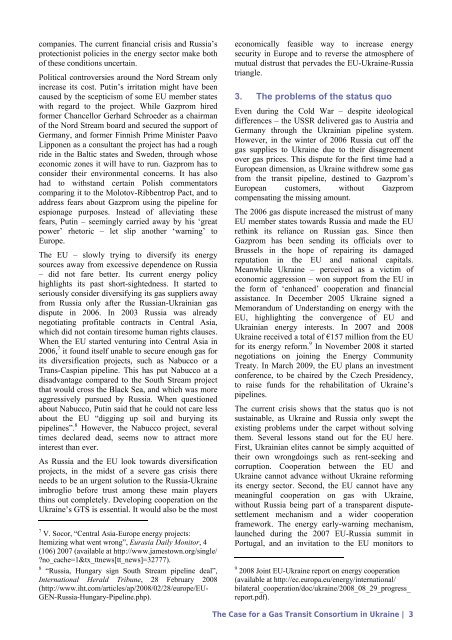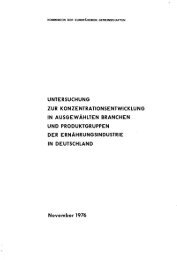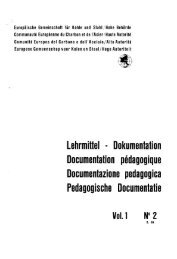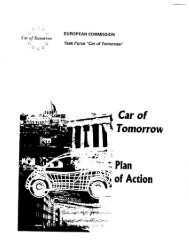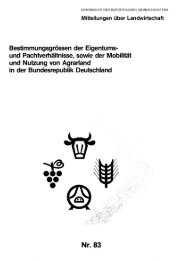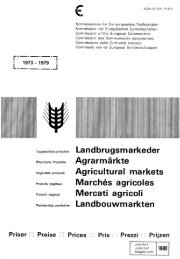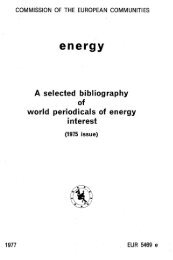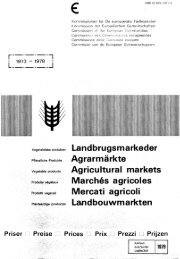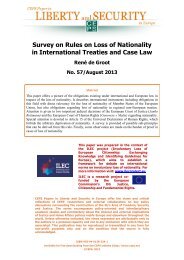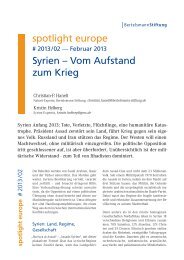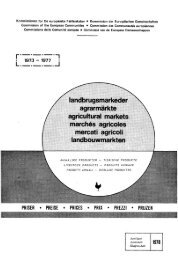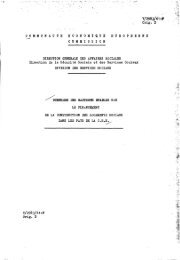The Case for a Gas Transit Consortium in Ukraine: - The Centre for ...
The Case for a Gas Transit Consortium in Ukraine: - The Centre for ...
The Case for a Gas Transit Consortium in Ukraine: - The Centre for ...
You also want an ePaper? Increase the reach of your titles
YUMPU automatically turns print PDFs into web optimized ePapers that Google loves.
companies. <strong>The</strong> current f<strong>in</strong>ancial crisis and Russia’s<br />
protectionist policies <strong>in</strong> the energy sector make both<br />
of these conditions uncerta<strong>in</strong>.<br />
Political controversies around the Nord Stream only<br />
<strong>in</strong>crease its cost. Put<strong>in</strong>’s irritation might have been<br />
caused by the scepticism of some EU member states<br />
with regard to the project. While Gazprom hired<br />
<strong>for</strong>mer Chancellor Gerhard Schroeder as a chairman<br />
of the Nord Stream board and secured the support of<br />
Germany, and <strong>for</strong>mer F<strong>in</strong>nish Prime M<strong>in</strong>ister Paavo<br />
Lipponen as a consultant the project has had a rough<br />
ride <strong>in</strong> the Baltic states and Sweden, through whose<br />
economic zones it will have to run. Gazprom has to<br />
consider their environmental concerns. It has also<br />
had to withstand certa<strong>in</strong> Polish commentators<br />
compar<strong>in</strong>g it to the Molotov-Ribbentrop Pact, and to<br />
address fears about Gazprom us<strong>in</strong>g the pipel<strong>in</strong>e <strong>for</strong><br />
espionage purposes. Instead of alleviat<strong>in</strong>g these<br />
fears, Put<strong>in</strong> – seem<strong>in</strong>gly carried away by his ‘great<br />
power’ rhetoric – let slip another ‘warn<strong>in</strong>g’ to<br />
Europe.<br />
<strong>The</strong> EU – slowly try<strong>in</strong>g to diversify its energy<br />
sources away from excessive dependence on Russia<br />
– did not fare better. Its current energy policy<br />
highlights its past short-sightedness. It started to<br />
seriously consider diversify<strong>in</strong>g its gas suppliers away<br />
from Russia only after the Russian-Ukra<strong>in</strong>ian gas<br />
dispute <strong>in</strong> 2006. In 2003 Russia was already<br />
negotiat<strong>in</strong>g profitable contracts <strong>in</strong> Central Asia,<br />
which did not conta<strong>in</strong> tiresome human rights clauses.<br />
When the EU started ventur<strong>in</strong>g <strong>in</strong>to Central Asia <strong>in</strong><br />
2006, 7 it found itself unable to secure enough gas <strong>for</strong><br />
its diversification projects, such as Nabucco or a<br />
Trans-Caspian pipel<strong>in</strong>e. This has put Nabucco at a<br />
disadvantage compared to the South Stream project<br />
that would cross the Black Sea, and which was more<br />
aggressively pursued by Russia. When questioned<br />
about Nabucco, Put<strong>in</strong> said that he could not care less<br />
about the EU “digg<strong>in</strong>g up soil and bury<strong>in</strong>g its<br />
pipel<strong>in</strong>es”. 8 However, the Nabucco project, several<br />
times declared dead, seems now to attract more<br />
<strong>in</strong>terest than ever.<br />
As Russia and the EU look towards diversification<br />
projects, <strong>in</strong> the midst of a severe gas crisis there<br />
needs to be an urgent solution to the Russia-Ukra<strong>in</strong>e<br />
imbroglio be<strong>for</strong>e trust among these ma<strong>in</strong> players<br />
th<strong>in</strong>s out completely. Develop<strong>in</strong>g cooperation on the<br />
Ukra<strong>in</strong>e’s GTS is essential. It would also be the most<br />
7 V. Socor, “Central Asia-Europe energy projects:<br />
Itemiz<strong>in</strong>g what went wrong”, Eurasia Daily Monitor, 4<br />
(106) 2007 (available at http://www.jamestown.org/s<strong>in</strong>gle/<br />
?no_cache=1&tx_ttnews[tt_news]=32777).<br />
8 “Russia, Hungary sign South Stream pipel<strong>in</strong>e deal”,<br />
International Herald Tribune, 28 February 2008<br />
(http://www.iht.com/articles/ap/2008/02/28/europe/EU-<br />
GEN-Russia-Hungary-Pipel<strong>in</strong>e.php).<br />
economically feasible way to <strong>in</strong>crease energy<br />
security <strong>in</strong> Europe and to reverse the atmosphere of<br />
mutual distrust that pervades the EU-Ukra<strong>in</strong>e-Russia<br />
triangle.<br />
3. <strong>The</strong> problems of the status quo<br />
Even dur<strong>in</strong>g the Cold War – despite ideological<br />
differences – the USSR delivered gas to Austria and<br />
Germany through the Ukra<strong>in</strong>ian pipel<strong>in</strong>e system.<br />
However, <strong>in</strong> the w<strong>in</strong>ter of 2006 Russia cut off the<br />
gas supplies to Ukra<strong>in</strong>e due to their disagreement<br />
over gas prices. This dispute <strong>for</strong> the first time had a<br />
European dimension, as Ukra<strong>in</strong>e withdrew some gas<br />
from the transit pipel<strong>in</strong>e, dest<strong>in</strong>ed to Gazprom’s<br />
European customers, without Gazprom<br />
compensat<strong>in</strong>g the miss<strong>in</strong>g amount.<br />
<strong>The</strong> 2006 gas dispute <strong>in</strong>creased the mistrust of many<br />
EU member states towards Russia and made the EU<br />
reth<strong>in</strong>k its reliance on Russian gas. S<strong>in</strong>ce then<br />
Gazprom has been send<strong>in</strong>g its officials over to<br />
Brussels <strong>in</strong> the hope of repair<strong>in</strong>g its damaged<br />
reputation <strong>in</strong> the EU and national capitals.<br />
Meanwhile Ukra<strong>in</strong>e – perceived as a victim of<br />
economic aggression – won support from the EU <strong>in</strong><br />
the <strong>for</strong>m of ‘enhanced’ cooperation and f<strong>in</strong>ancial<br />
assistance. In December 2005 Ukra<strong>in</strong>e signed a<br />
Memorandum of Understand<strong>in</strong>g on energy with the<br />
EU, highlight<strong>in</strong>g the convergence of EU and<br />
Ukra<strong>in</strong>ian energy <strong>in</strong>terests. In 2007 and 2008<br />
Ukra<strong>in</strong>e received a total of €157 million from the EU<br />
<strong>for</strong> its energy re<strong>for</strong>m. 9 In November 2008 it started<br />
negotiations on jo<strong>in</strong><strong>in</strong>g the Energy Community<br />
Treaty. In March 2009, the EU plans an <strong>in</strong>vestment<br />
conference, to be chaired by the Czech Presidency,<br />
to raise funds <strong>for</strong> the rehabilitation of Ukra<strong>in</strong>e’s<br />
pipel<strong>in</strong>es.<br />
<strong>The</strong> current crisis shows that the status quo is not<br />
susta<strong>in</strong>able, as Ukra<strong>in</strong>e and Russia only swept the<br />
exist<strong>in</strong>g problems under the carpet without solv<strong>in</strong>g<br />
them. Several lessons stand out <strong>for</strong> the EU here.<br />
First, Ukra<strong>in</strong>ian elites cannot be simply acquitted of<br />
their own wrongdo<strong>in</strong>gs such as rent-seek<strong>in</strong>g and<br />
corruption. Cooperation between the EU and<br />
Ukra<strong>in</strong>e cannot advance without Ukra<strong>in</strong>e re<strong>for</strong>m<strong>in</strong>g<br />
its energy sector. Second, the EU cannot have any<br />
mean<strong>in</strong>gful cooperation on gas with Ukra<strong>in</strong>e,<br />
without Russia be<strong>in</strong>g part of a transparent disputesettlement<br />
mechanism and a wider cooperation<br />
framework. <strong>The</strong> energy early-warn<strong>in</strong>g mechanism,<br />
launched dur<strong>in</strong>g the 2007 EU-Russia summit <strong>in</strong><br />
Portugal, and an <strong>in</strong>vitation to the EU monitors to<br />
9 2008 Jo<strong>in</strong>t EU-Ukra<strong>in</strong>e report on energy cooperation<br />
(available at http://ec.europa.eu/energy/<strong>in</strong>ternational/<br />
bilateral_cooperation/doc/ukra<strong>in</strong>e/2008_08_29_progress_<br />
report.pdf).<br />
<strong>The</strong> <strong>Case</strong> <strong>for</strong> a <strong>Gas</strong> <strong>Transit</strong> <strong>Consortium</strong> <strong>in</strong> Ukra<strong>in</strong>e | 3


